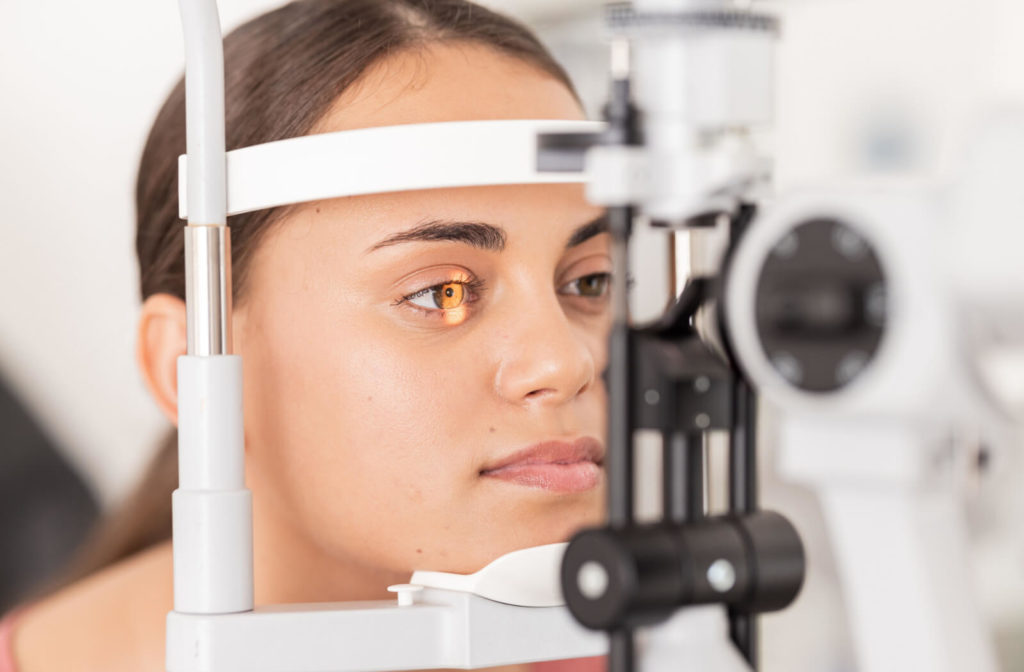Contact lenses can offer a convenient alternative to glasses for many people with vision issues. But can you wear contact lenses for astigmatism? Yes, you can wear contact lenses for astigmatism, a refractive error that causes distorted vision.
Your eye doctor can determine if you’re a candidate for contact lenses by conducting a contact lens exam. If you’re a candidate, they will recommend a type of contact lens based on the amount of astigmatism you have.
What Is Astigmatism?
Astigmatism is a common eye condition that can cause blurred or distorted vision, often due to an irregularly shaped cornea (the clear front part of the eye) or lens (the inner part of the eye). An irregular cornea or lens causes light to bend incorrectly when entering the eye, leading to a refractive error.
You may not realize or notice symptoms if you have mild astigmatism. Because of this, regular comprehensive eye exams are vital to diagnose astigmatism and monitor your vision. Your eye doctor can diagnose astigmatism by performing a visual acuity test to determine how sharp your vision is.
Symptoms of astigmatism can include:
- Blurry vision
- Squinting to see clearly
- Headaches
- Eye strain
- Trouble seeing at night
Common treatment options for astigmatism include eyeglasses, contact lenses, or refractive surgery to help you see clearly. Speak to your optometrist to see if you’re a candidate for laser eye surgery to correct astigmatism.
What Are Contact Lenses?
Contact lenses can provide crisp vision without the need for glasses. Contact lenses rest on the tear film covering your eye and correct refractive errors, such as nearsightedness, farsightedness, and astigmatism, by altering how light enters the eye and helping it focus directly on the retina (the light-sensitive tissue at the back of the eye) for vision clarity.
Different Types of Contact Lenses
There are two main types of contact lenses: soft and rigid gas permeable (RGP) contact lenses. Soft lenses are comfortable and easy to adjust to, while RGP lenses provide sharper vision and are more durable. For those with astigmatism, contact lenses offer a smooth refractive surface that compensates for the irregular shape of the cornea or lens.
Contact Lenses for Astigmatism
Finding the most suitable corrective lenses for your astigmatism involves seeing your eye doctor and having a contact lens exam and fitting. During this exam and fitting, your eye doctor will measure the size of your pupil, the shape of your eye, and the quality of your tear film. Once your eye doctor approves you’re a candidate for contact lenses, they may recommend several types of contacts for astigmatism.
Toric Contact Lenses
Toric contact lenses are soft contact lenses that conform to the shape of the cornea. These lenses have hydrogel and silicone hydrogel materials, making the contacts more breathable.
Unlike regular lenses, toric contact lenses can correct nearsightedness and farsightedness in different areas of the lens. While toric lenses can effectively correct astigmatism, they may require looking at several brands before finding one that fits your eyes.
Rigid Gas Permeable Contact Lenses
Rigid-gas permeable (RGP) lenses are different from soft toric lenses as they don’t have the specialized design of toric lenses. RGP lenses are hard lenses, meaning they can retain their shape. Scleral lenses are gas-permeable lenses that are larger in size than regular lenses and can work well for irregular eye surfaces like in astigmatism.
Hybrid Contact Lenses
Hybrid lenses are a combination of soft and hard contacts. The center of hybrid lenses is rigid-gas permeable, and the surrounding area is hydrogel or silicone hydrogel. Because of the design, these lenses are less likely to become dislodged.
Customized Contact Lenses for Individual Needs
Many manufacturers now offer customized toric, gas-permeable, and hybrid lenses to fit the unique curvature of your cornea and degree of astigmatism. However, before getting contact lenses for astigmatism, your eye doctor will need to consider the following:
- Your eye health
- Prescription requirements
- Your lifestyle
- Your replacement schedule
Tips for Contact Lens Wearers with Astigmatism
To maintain the longevity of your lenses and the health of your eyes, follow these tips:
- Maintain proper lens care routine
- Practice good hygiene
- Use only contact lens solution to clean and store your lenses
- Clean your contact lens storage case weekly
- Replace your contact lens storage case every 3 months
- Remove your contacts if you experience irritation or discomfort
- Avoid wearing your contacts when swimming or showering
- Only sleep in your contacts if your eye doctor approves
- Schedule regular check-ups with your eye doctor

Contact Lenses for Vision Correction
Although astigmatism requires special attention and custom-made lenses, your eye doctor can determine if you’re a candidate for contacts and recommend several options, such as toric, RGP, and hybrid lenses.
If you have astigmatism, book an appointment with Dr. Taylor Bladh, O.D., for prescription lenses suitable for your eye health, comfort, and vision correction needs.



